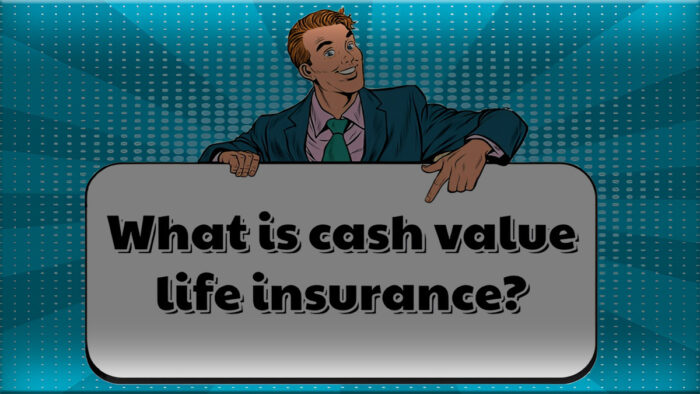Cash value life insurance is a type of life insurance policy that has two components: a death benefit and a cash value component. The death benefit is the amount of money that is paid out to the policyholder’s beneficiaries when they die. The cash value component is a separate account that is part of the policy, and it can be used for a variety of purposes, such as loans, withdrawals, or to cover the cost of the policy premiums.

The cash value of a life insurance policy is essentially a savings account that grows over time. The growth is tax-deferred, which means that you don’t have to pay taxes on the gains until you withdraw the money. It can be more expensive than term life insurance, but the premiums are generally fixed for the life insurance of the policy.
It’s also worth noting that the cash value of the policy is not guaranteed and may be affected by the underlying investments. It’s important to carefully consider your financial situation and goals before deciding if it is right for you.
How It Works
Cash value life insurance provides lifelong coverage. When you purchase it, you’ll choose a death and benefit amount and a premium amount. You’ll then make a regular payment to fund the policy, which will cover the cost of insurance and grow the cash value account.
The cash value account is typically invested in a variety of assets. The growth of the cash value is not guaranteed and may be affected by the performance of underlying investments. However, the death benefit is guaranteed to be paid out to your beneficiaries when you die.
The cash value account can be accessed in two ways: through loans or withdrawals. With a loan, you’ll borrow money from the cash value of your insurance coverge, and the loan is paid back with interest. If you pass away before you finish paying off your loan, the insurance company will deduct the remaining balance from the death benefit paid to your beneficiaries.
With a withdrawal, you’ll actually remove funds from your account, and you may have to pay taxes and fees on the withdrawal.
Types of Cash Value Life Insurance
- Whole life insurance: This type of policy has a level premium and guaranteed cash value growth. Whole life insurance is typically more expensive than other life insurance options.
- Guaranteed-issue life insurance is a type of life insurance that doesn’t require a medical exam or questions about health. Guaranteed issue life insurance premiums are typically higher than for other types of life insurance, and the cash value growth is typically lower. Some guaranteed-issue life insurance policies also have a graded death benefit.
- Universal life insurance: There are a few types of universal life insurance. Such as:
- Guaranteed Universal Life: This is a policy that has flexible premiums and an interest-sensitive cash value. The interest rate is variable, which means it can change over time.
- Variable universal life insurance: this type of policy has a cash value that’s invested in a range of separate accounts, like mutual funds.
- Indexed universal life insurance—this is a policy that’s tied to an investment index, like the S&P 500. The cash value growth is linked to the performance of the index. So it can grow faster or slower depending on how it performs.
- Term life insurance is not a type of permanent life insurance and, therefore, does not offer a cash value component.
Pros and Cons
Cash value life insurance can be a powerful tool for wealth accumulation and financial security, but it’s not without its downsides. Before deciding if it is right for you, it’s important to weigh the pros and cons carefully.
Pros
- Your beneficiaries receive a death benefit. When you pass away, your beneficiaries will receive a death benefit that’s equal to the policy’s face value.
- Participating in life insurance policies has dividends. This is a type of whole life insurance that offers a share of the company’s profits in the form of dividends. Those dividends can be used to reduce premiums, increase the death benefit, or add to the cash value.
- Potential for tax-deferred growth. It can provide tax-deferred growth, access to cash during your lifetime, and a guaranteed death benefit.
- Riders for extra coverage. Rider allows you to customize your cash value life insurance policy to meet your specific needs. They can provide protection against risks, such as disability or long-term care expenses.
Cons
- Premium cost. It is typically higher than term life insurance premiums since you’re paying for the added benefits of the cash value account. If you don’t need insurance for the duration of your life and you don’t care about the added cash value, term life insurance will be a better option for you.
- Growth of cash value. The growth of the cash value account is based on the performance of the underlying investments, so it’s not guaranteed. If the investments don’t perform well, the cash value may not grow as expected.
- Taxes and fees. The cash value account may be subject to taxes and fees, depending on how it’s structured. This can impact your overall return on investment.
- Cash value is not for beneficiaries in most cases. The death benefit is paid to your beneficiaries, not the cash value.
The pros and cons of this insurance policy should be carefully considered before you decide if it’s the right option for you.
How Much Does Cash Value Life Insurance Cost?
The cost of cash value life insurance can vary depending on several factors. This includes your age, health, ZIP code, and the size of the coverage. As a rough estimate, you can expect to pay anywhere from $100 to $500 per month, or more. The best way to get an accurate estimate is to talk to a financial professional and get quotes from different insurance companies.
How to Buy Cash Value Life Insurance
If you’re interested in purchasing this insurance policy, there are a few steps you can take. First, you’ll need to determine how much coverage you need and what type of policy is right for you. Next, you can get quotes from different insurance companies and compare the costs and benefits of each option.
Finally, contact an insurer or a licensed agent to discuss, apply for the policy, and go through the underwriting process. This involves answering questions about your health and medical history.
FAQs
How does cash value accumulate?
Cash value accumulates through a portion of your premium payments, which are invested by the insurance company in a variety of assets such as stocks, bonds, or money market funds. The cash value grows tax-deferred, meaning you don’t pay taxes on the growth until you withdraw it.
How can I access the cash value of my policy?
You can access the cash value of your policy through policy loans or withdrawals. Policy loans allow you to borrow against the cash value of your policy, while withdrawals involve taking out a portion of the cash value. Both options have implications for the policy’s death benefit and may be subject to interest or fees.
What happens if I surrender my cash value life insurance policy?
If you surrender your cash value life insurance policy, you’ll receive the cash surrender value, which is the amount of cash value accumulated minus any surrender charges or fees imposed by the insurance company. Surrendering the policy terminates coverage, so it’s essential to consider the implications before making this decision.
Can I use the cash value of my policy to pay premiums?
Depending on the type of policy you have, you may have the option to use the cash value to pay premiums. This feature, known as “premium offset,” allows you to reduce or eliminate out-of-pocket premium payments by using the cash value to cover the cost of insurance.
Is cash value life insurance right for me?
Whether cash value life insurance is right for you depends on your financial goals, risk tolerance, and insurance needs. It’s essential to carefully evaluate the features and costs of different policies. Also, consult with a financial advisor to determine the best option for your specific situation.



